
 |
||||
|---|---|---|---|---|
| Volume 50 Number 32, August 22, 2020 | ARCHIVE | HOME | JBCENTRE | SUBSCRIBE |
Workers' Weekly Internet Edition: Article Index : ShareThis
Government Humiliated over Pupil Grades:
Students Take a Stand for their Right to Education
Spirited Rally in Newcastle Affirms Students Will Continue the Fight
Unions Take a Stand
Universities Require Urgent Financial Support from Government after A-levels U-turnGovernment Abolishes Public Health England:
Government Goes from One Reckless Decision to Another

The debacle over the awarding of grades to A-Level students in the conditions of the pandemic has shown both that the government has no concern for the rights and humanity of the people, particularly the youth, and that the students have been inspired to act in their own name and defend both their own future and the character and values of a modern education system. Students took to the streets at many places around Britain over the awarding of deflated grades through an algorithm. In London, on August 19, students demonstrated outside Downing Street and at Parliament Square. A further demonstration is due to take place on Saturday, August 22, at Marble Arch at 1pm. A rally also took place in Newcastle on August 19 (see article below).
The collective stand of the mass of students, including the threat of legal action, exposed the callous position of the government in relying on an algorithm to over-ride the teacher-assessed grades which were necessary with exams prevented because of the pandemic. This is a victory for the angered students, but it also exposes the problems at the heart of the education system which the pandemic has revealed starkly. It has underlined how the right to an education must be fought for.
The government had thought that it could ride roughshod over the right to higher education of A-Level students because of the conditions of the pandemic. The students have demonstrated that the pandemic cannot be used as a justification to play fast and loose with the lives of young people.
In fact, the battle continues, since in the time between the downgraded results of the Ofqual algorithm being announced and the government backing down, students have been making other arrangements to secure places at universities that were not their first choice. Education Secretary Gavin Williamson on August 17 confirmed that a cap on the number of students who can be accepted by universities would be lifted, but universities require the funding to take extra students. In addition, the government, and the Education Secretary in particular, refuse to be held accountable for the fiasco, which has demonstrated the disregard of those in authority for the future of the lives of young people as well as the attempt to negate the human factor. The demand now is that university places be found for all students who need them.
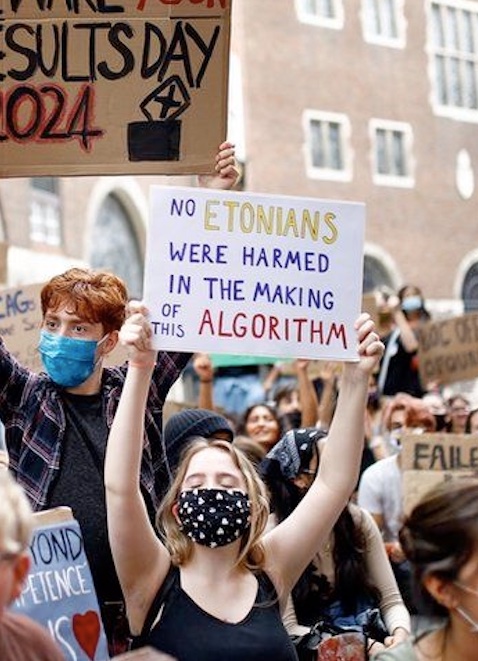
The algorithm meant that as many as 40% of students had their results downgraded from the grades that were predicted by their schools. The algorithm disproportionately downgraded students in low-performing state schools, usually in the most deprived areas. While private schools saw a 4.7% increase in the number of students who received an A or above compared to last year, secondary comprehensive schools saw just a 2% increase and academies saw only a 1.7% increase. Extraordinarily, over 21,000 students got awarded a U grade, which is usually given to students who do not turn up to the exam or write anything in the exam.
In an article "Government must listen to teachers or face recurring chaos" written for Schools Week, Alison Peacock, CEO of the Chartered College of Teaching, points out: "Lack of equity within our society has been starkly brought into relief as we have collectively tried to respond to lockdown. The harsh impact of Covid-19 particularly for some areas experiencing disadvantage has been shown through the death rates published by the Office of National Statistics. Often these areas map directly on to those where schools are working against the odds to support their students. In too many cases, students in these schools risked being the ones most unfairly caught out by system-level moderation solutions. Did the government really believe that teachers and young people would stand by and let this happen?"
It has been reported that Gavin Williamson was warned six weeks ago that the A-level and GCSE grading system used in the absence of this year's exams could lead to thousands of students being given the discriminatory results. A senior source at the Department for Education told The Times that Sir Jon Coles, a former director-general for standards, wrote to the Education Secretary to express his concerns over the Ofqual algorithm. He is said to have told the Cabinet minister that the model applied to A-Level and GCSE grades would only be "75% accurate", which would affect hundreds of thousands of students. In the event, Ofqual's own analysis acknowledged that the model had predictive accuracy of around 60%.
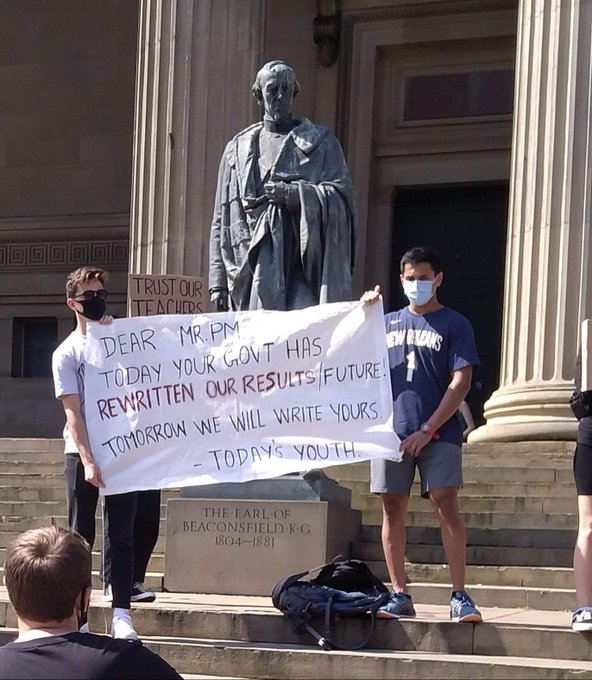
MPs on the the Education Select Committee in early July had also warned the Department for Education: "We are extremely concerned that Ofqual's standardisation model does not appear to include any mechanism to identify whether groups such as BAME pupils, FSM [free school meal] eligible pupils, children looked after, and pupils with SEND [special educational needs] have been systematically disadvantaged by calculated grades."
As with every issue during this pandemic, in particular the issue of the safe opening of schools, the necessity for those concerned to be involved in the decision-making process, and indeed their right to be involved, has been ignored or negated. And as with the issue of the safe opening of schools and the implementation of online learning, for example, the right for teachers, lecturers, students and others affected by what is decided to be involved, together with the procedure for deciding which students go on to university or further education, has raised the question of the character of education itself, and the participation of the students themselves in working this out.
The issue has also raised the question of how education should be funded, in particular the funding for higher and further education. There is a necessity for a turning point in the financing of education. The whole issue of the character, values and funding of further and higher education shows the need for a public discussion on how to solve the issues. It has been the case for some time, with the increase of the anti-social offensive, that all sectors of an all-round education to prepare the coming generation to take up its responsibility for society have been under attack, especially the humanities. In addition, the imposition of fees, with students being saddled with a life-time of debt, is being challenged. It is particularly galling for the disadvantaged who, with working people as a whole, have been treated with contempt by the ruling elite.
Despite the government's humiliation in this grading fiasco, it is refusing to be accountable, as with many other issues where it has shown itself culpable. This is unacceptable, and points to the need for mechanisms to be built to render accountable those who claim to represent the electorate. What the upsurge in the students has shown is that the movements of the people to fight for their rights is growing, and that this resistance must assume an organisational and political direction. We congratulate the whole student body in what has been accomplished in taking up this challenge, and their fight to implement the principle that education is a right.
David McAllister, Counterfire
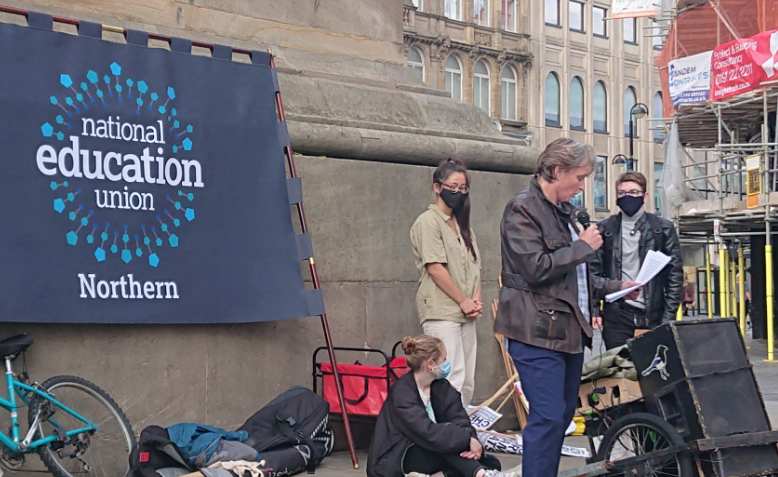
Students and teachers in Newcastle on August 19 marked a crucial victory over downgrading, and demanded Education Secretary Gavin Williamson's resignation and that education justice should prevail.
In what was originally planned as a protest against the shameful downgrading of A-level students by the cruel Ofqual algorithm, students and teachers instead gathered in Newcastle in a spirit of triumph following the news of the Tories' U-turn in the face of popular pressure.
The event, hosted by local National Education Union (NEU) branches including North Tyneside, Gateshead and Durham, was instead billed as a victory rally. But it also added two further demands - that students should now be guaranteed the university places denied them by the downgrading, and that Gavin Williamson pays for this cruelty with his job.
Emma Parker of the NEU congratulated the students on their victory and asserted that the right to an education "should not be dictated by your postcode". She also linked the battle for fair results to the need for a teacher's professional judgement to be trusted. Just like teachers trust their students to achieve, the government should trust teachers to be the best judges of that achievement.
Several students emphasised the unnecessary stress they have been put through, and made it very clear that this was a crude attempt to defend class privilege. One female student said that the algorithm "punished the working classes, and rewarded the rich elite", accurately pointing out how the downgrading fell disproportionately on those from poorer backgrounds.
Wansbeck MP Ian Lavery expressed delight at what the students have achieved in forcing the U-turn, but added that there are other battles to be won in order to further push back against the cruel logic of class privilege which continues to limit the life chances of millions of young people, and to fight for a fairer education system for all.
Tony Dowling, a retired teacher speaking on behalf of the People's Assembly Against Austerity, said that this was a crucial victory in a wider battle against education inequality and against years of attacks on public services and working class people's lives.
These sentiments were widely shared at the rally. Daniel Kebede, NEU Vice President, reminded everyone of the sickening levels of child poverty in this country. Child poverty, like downgrading, is a result of deliberate political choices. This means that if we unite, then we can overturn the Tories' malicious agenda against all working class people.

National Education Union (NEU) press release, August 13, 2020
Dr Mary Bousted, Joint General Secretary of the National Education Union, said:
"After months of defending the system devised by Ofqual to determine this year's GCSE and A-Level grades, Gavin Williamson has been forced into an embarrassing U-turn. He should have listened to the concerns raised much earlier by teachers and assessment experts. Ignorance and inaction appear to have been his watchwords."
NEU: Government forced into U-turn on A-Level exam grades, August 17, 2020
Commenting on the decision, Dr Mary Bousted, Joint General Secretary of the National Education Union, said:
"Gavin Williamson has, finally, done the right thing. The pity is that he has done so having exhausted all other options. Students and their teachers have endured days of completely unnecessary stress and worry. For many students, this announcement will generate further uncertainty if they have been rejected from their first-choice course, and university, on the basis of the inaccurate and unjust Ofqual awarding process.
"Young people have suffered enough. They have few chances in the jobs market as the country faces rising unemployment and recession. It is right that the cap on university places has been lifted, so that more young people, who have worked so hard for their A-Levels, can continue their studies and fulfil their potential.
"One of many lessons for government to learn from this sorry saga is to listen to the profession. The Department for Education's determination to put all eggs in one basket through a single set of summer exams has come back to haunt them. It is very much a disaster of their own making.
"This is a shameful episode. It must never happen again. The U-turn in Scotland includes a long-term review of the assessment methods used to award qualifications, including the possibility of more coursework and systematic, moderated teacher assessment, and it is critical that the same occurs in England.
"We not only need a careful and systematic review, but an absolute assurance to next year's GCSE and A-Level students that this cannot and will not happen again."
NEU Cymru welcomes use of assessed grades in Wales. August 17, 2020
NEU Cymru hugely welcomes this decision from the Education Minister.
Speaking about the Education Minister's announcement to use assessed grades for A-Level and GCSE's this year, David Evans, Wales Secretary for the National Education Union Cymru said:
"NEU Cymru hugely welcomes this decision from the Education Minister. Students will be heartened to hear that their teacher assessed grades will be used for both A-Level and GCSE - giving justice to our students who have had a very difficult time in recent months.
"Wales was already in a more sensible place than England - with students still taking AS-Levels, and grades being more reliant on course work. But this is great news for young people, and the teachers and lecturers who have supported them.
"This all goes to show that we need to trust teachers and lecturers. We believe they know young people best, and shows what a loaded system exams are. We congratulate the young people on joining together and seeking justice. We hope now that universities can be flexible, and help support the young people to ensure they have a future based on their potential - not the calculations of a biased computer programme."
NASUWT comments on exam grades U-turn, August 17, 2020
Commenting on the U-turn by the government on A-Level and GCSE grades for summer 2020, NASUWT General Secretary Dr Patrick Roach, said:
"Young people have faced an enormous amount of uncertainty and anxiety as a result of the government's chaotic handling of this summer's qualification awards.
"The Coronavirus pandemic has created very challenging conditions for students and for schools and colleges, but the government's mishandling has undermined public confidence at this critical time.
"No young person should have their future life chances undermined by a set of circumstances outside their control.
"However, at the centre of this latest political storm are young people whose futures have been left unacceptably at the mercy of last-minute decision-making by Ministers.
"The calamity that has been left to unfold over recent days has impacted not only on those young people who were receiving their awards this year, but also the confidence of the thousands of pupils who are now preparing for examinations next year.
"Urgent lessons need to be learned about how to secure a more resilient qualifications system for the future that will give confidence to pupils, parents and teachers, and recognise fairly the achievements of all students."
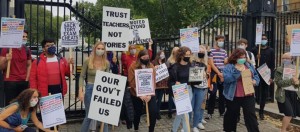
The University and College Union (UCU) and the National Union of Students (NUS) have signed a joint letter to Education Secretary Gavin Williamson warning that the lifting of the cap on university places will "remove one of the only interventions that the government has made to help mitigate the financial impact of the Covid-19 crisis on universities".
In the context of universities demanding significant financial support from the government to meet any increase in student intake, the joint letter said: "While it is still unclear exactly what the distribution of domestic students across higher education will be, it is widely anticipated that institutions will move as much as possible to honour their offers. This will likely lead to expanded recruitment at high-tariff institutions at the expense of lower-tariff universities, shifting the financial pain from the Covid-19 crisis onto many of the institutions that play a vital role in widening participation and social mobility."
The letter continues: "The role of universities in training the medical workforce is essential for all regions and nations of the UK, as clearly shown by our members' response to the Covid-19 pandemic."

Universities UK, the representative organisation of the 137 universities in England, Scotland, Wales and the north of Ireland, has warned in this connection that medical schools may now have to turn prospective students away amid a surge in numbers with the grades to get in. Places on medical courses have been capped on grounds of cost and the impact on the NHS of accommodating trainees.
In a letter to the Education Secretary from Universities UK, seen by the PA news agency, vice-chancellors said institutions who were missing out on expected students would now need help "to stabilise their finances" in light of the U-turn.
"The move to using centre-assessed grades will rightly address the inequalities suffered by many students from disadvantaged backgrounds by use of the original algorithm," they said. "However, it will also result in significant overall grade inflation leading to significant decreases in planned enrolments at a number of institutions as students opt for higher tariff courses. Such institutions whose financial plans were based on the agreed temporary student number controls will now require additional government financial support."
(sources: The Independent, Universities UK)
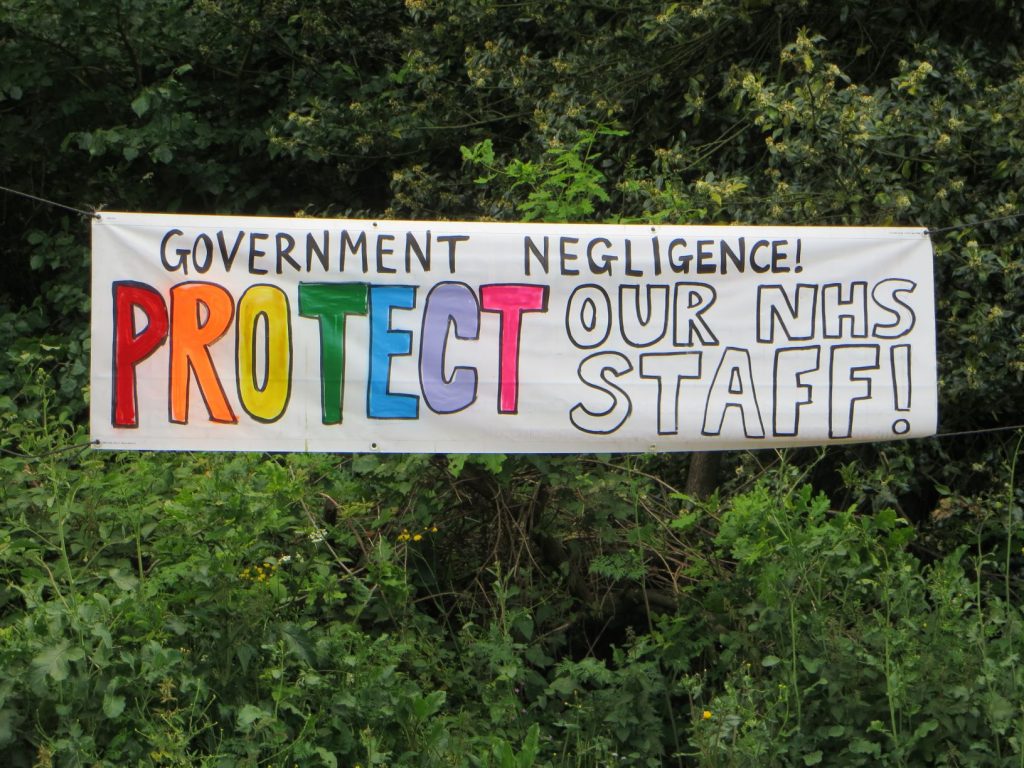
On Sunday, August 17, the Telegraph [1] was briefed by ministers that the government was to "abolish" Public Health England (PHE) this week, an astonishingly reckless move. On August 19, the government then announced in a press release [2] the creation of a new National Institute for Health Protection that would be "immediately bringing together PHE, NHS Test and Trace and the Joint Biosecurity Centre under the interim leadership of Baroness Dido Harding, with a single command structure and operating model to tackle the Covid-19 pandemic". The statement said, "This is the first step towards becoming a single organisation, focused on tackling Covid-19 and protecting the nation's health."
This announcement of Matt Hancock, Secretary of State for Health, has not only thrown into chaos plans for continuing to tackle the coronavirus pandemic but is clearly aimed at deflecting the blame for its own handling of the crisis by blaming PHE. At the same time, the government has thrown into jeopardy a further 5,500 jobs of people who work at PHE. This has come after months of failure by handing out contracts of testing, tracking and tracing to private sector companies and side-lining local government public health directors and staff in identifying and containing local outbreaks. Now, when it is finally forced to admit that tackling this virus needs to be locally led by public health bodies, it hands over the whole of PHE to Baroness Dido Harding, the head of NHS Test and Trace [3], the private sector service provided to the NHS in England at huge cost to the Treasury, which has consistently failed to deliver on testing, tracking and tracing throughout the crisis.

The failure to prioritise preparations for a pandemic in the months before the Covid-19 outbreak in Wuhan was a government decision, not that of the PHE. On March 22, 2019, health minister Steve Brine wrote to PHE [4] setting out 14 goals for the coming year. Pandemic preparation was not mentioned. Securing Brexit was the top priority.
Originally public health services, including dealing with public health emergencies, were part of the NHS, provided by regional and local public health authorities jointly with council public health services in each part of the country. The PHE was only created in 2013 following the end of health authorities and the creation of commissioning groups. It was a separate body led centrally by PHE and locally by Health and Well-being Boards. These services were transferred over from the NHS and were then subject to huge cuts because of the government's massive reduction in council budgets. Many of those reduced services were then handed over to privatised contractors.
In this way public health services in England have been systematically undermined since 2014 by a spending cut of about £850 million [5], affecting all services, such as tackling obesity, public health programmes and exercise, and seriously impacting survival outcomes during the coronavirus pandemic. What is more, public health specialists, and particularly those public health directors and services run by the local councils, have been sidelined and frustrated that their voices were not being heard while key decisions were being taken.
The issue is not to be diverted by the government's attempt to hide its own responsibility for the massive failures by this move to blame PHE. It is also a blatant cover by the government to place these services firmly in the hands of private companies, who have already exposed their track record as one of maximising their profits out of the crisis at the expense of public health and the well-being of the people. It is another move of a callous and dangerous character during the coronavirus pandemic that is seeing the government go from one reckless decision to another, "piling risk upon risk as we head into a dangerous winter" [6].
Notes
1. "Farewell to Public Health England, and good riddance", the
Telegraph, August 17
https://www.telegraph.co.uk/opinion/2020/08/16/farewell-public-health-england-good-riddance/
2. "Government creates new National Institute for Health
Protection"
https://www.gov.uk/government/news/government-creates-new-national-institute-for-health-protection
3. NHS Test and Trace (Wikipedia)
All components - administering tests, processing samples in laboratories, and
contact tracing - are contracted to private companies, with logistic support
from the army. Multinational consultants Deloitte handle testing logistics,
including collection of statistics, and in turn appointed outsourcing companies
Serco, Mitie, G4S and Sodexo, together with the Boots pharmacy chain, to run
drive-through test centres. Deloitte also co-ordinates three new centres known
as Lighthouse Labs where samples are processed, involving pharmaceutical
companies GlaxoSmithKline and AstraZeneca, the army, Amazon and Boots.
4. Letter of Health Minister Steve Brine to Duncan Selbie, Chief Executive
Public Health England, March 22, 2020
https://assets.publishing.service.gov.uk/government/uploads/system/uploads/attachment_data/file/789194/phe-priorities-in-health-and-care-2019-2020-letter.pdf
5. The Progressive Policy Think Tank
https://www.ippr.org/blog/public-health-cuts
6. "Matt Hancock crashes from one unforced error to the next without
counting the cost", the Guardian, August 21
https://www.theguardian.com/society/2020/aug/21/matt-hancock-abolishing-public-health-england
Receive Workers'
Weekly E-mail Edition: It
is free to subscribe to the e-mail edition
We encourage all those who support the work of RCPB(ML) to also support it
financially:
Donate to
RCPB(ML)
Workers' Weekly is the weekly on
line newspaper of the
Revolutionary Communist Party of Britain (Marxist-Leninist)
Website:
http://www.rcpbml.org.uk
E-mail:
office@rcpbml.org.uk
170, Wandsworth Road, London, SW8 2LA.
Phone: 020 7627 0599: